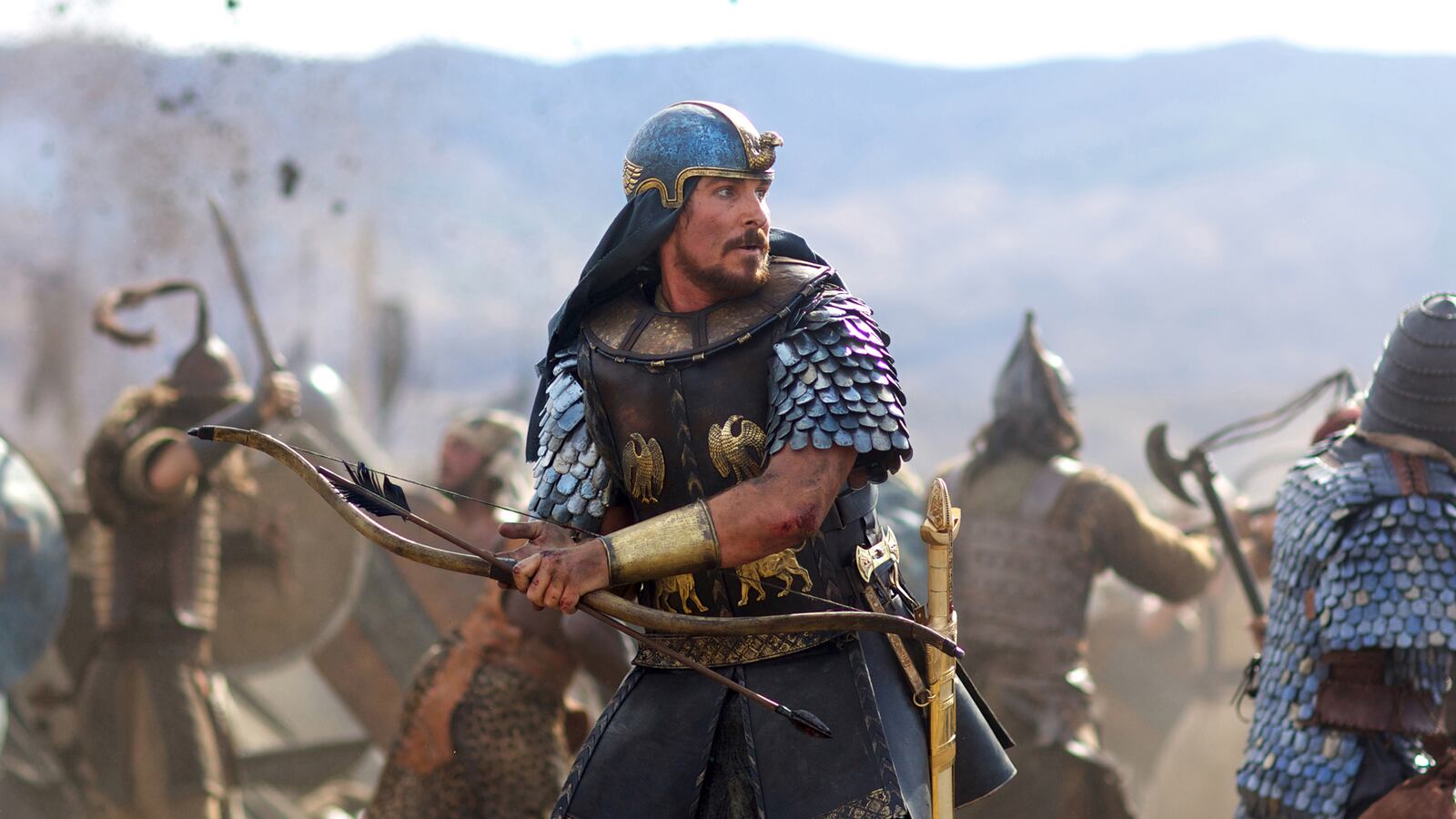Among the many inexplicably poor choices made by the producers of Exodus: Gods and Kings—a release date months from Passover, a subtitle that will surely discomfort some monotheists in the potential audience, a Red Sea crossing that, unadorned by special effects, resembles a huge clamming expedition—there is one poor choice that does, at least, bear explanation: The decision to give Moses, in the opening minutes of the film’s tedious two-plus hours, a sword.
Not just a plain iron sword but a gleaming, gold-hilted one that is foregrounded by the film almost fetishistically. In one scene Moses nearly caresses the sword, running a cloth down the blade—a gesture that seemed certain to sever fingers—and looking down its length as though drawing a bead on a target. It will not be long before he holds that sword, in perhaps the most egregious violations of plausibility, against the throat of his adversary, the Pharaoh Ramses, and even nicks the flesh of the famously hard-hearted tyrant (portrayed here instead as a gum-chewing lout).
The sword is only one of the film’s many efforts to recast Moses, a reluctant, self-doubting prophet in the Biblical story, as a military hero in the Gladiator mode. God, who here speaks through the voice of (or actually is?) a ten-year-old boy, addresses Moses as “general.” A profoundly implausible montage shows Moses turning Hebrew slaves into a band of insurgents by training them in archery and horsemanship. And, in a gratuitous show of homicidal prowess, Moses kills two assassins he meets while wandering in the desert of Sinai. Who sent these assassins is a matter better left untouched; they have been conjured up only to give Moses an opportunity for hand-to-hand combat, beyond that of the equally gratuitous Egypto-Hittite battle in the film’s opening scenes.
In its efforts to build up Moses’s military bona fides, Exodus (the movie) actually strips out a miracle assigned to God by “Exodus” (the scripture). Pharaoh’s army, driving its war chariots in pursuit of the fleeing Hebrews, was blocked, in the latter text, by a divinely sent pillar of flame. In the film, Moses creates the delay with a bold strategic choice: He lead his people through a mountain pass too treacherous for chariots. Ramses ignores the warning signs—abandoned Hebrew wagons at the entrance to the pass—and charges forward into what becomes a debacle. Logistics wins the day, and the Supreme Deity is, at this juncture, nowhere to be seen.
The mountain-pass stratagem is of course familiar from 300, where it was the central ploy used by an army of Spartans to defeat invading Persians. I hope I can be forgiven for finding this echo more than merely coincidental. Hollywood has developed a habit of relying on what worked best in the past, and 300 was hugely successful. So, for that matter, was Gladiator, the previous foray into ancient legend by director Ridley Scott. Motifs of military heroism appear to have been lifted from both movies and grafted onto this one, creating a weird hybrid of Judaic and Greco-Roman myth.
No sensible moviegoer demands fidelity to the Bible from a modern Biblical epic (though it should be noted that Exodus troubles to depict each one of the ten plagues, in order, even though this leads to numbingly repetitive scenes of screaming Egyptians fleeing affliction). But insight into character is perhaps not too much to ask. The scriptural Moses is defined by his frailties, his inability to act. God has to continually prompt and prod him, and puts his brother Aaron at his side to do most of the real leadership. He is no general, and—though he kills an Egyptian in anger after seeing the man flogging one of his kin—he never, to my knowledge, carries a sword. His deficiencies and self-doubts, amid his epochal mission of liberation, are precisely what make him interesting.
Exodus nods to this unheroic tradition at the shores of the Red Sea, where Moses, beset by remorse after somehow leading the Hebrews along the wrong escape route, flings his sword into the sea. I was waiting for him to pick up the plain wooden staff that he wields so memorably in both the Book of Exodus and in Cecil B. De Mille’s The Ten Commandments. But then the sword is miraculously returned to him, and he girds for battle once again.
Perhaps in this movie’s sequel, he will fight Hercules.






